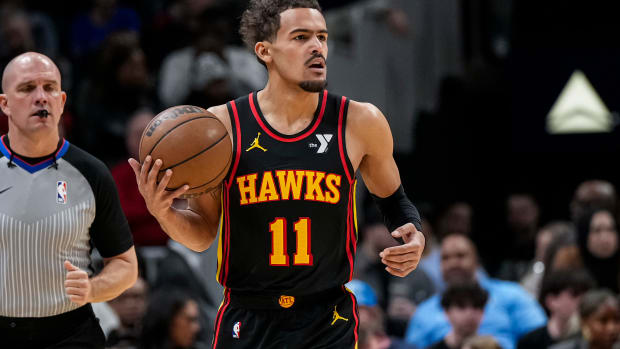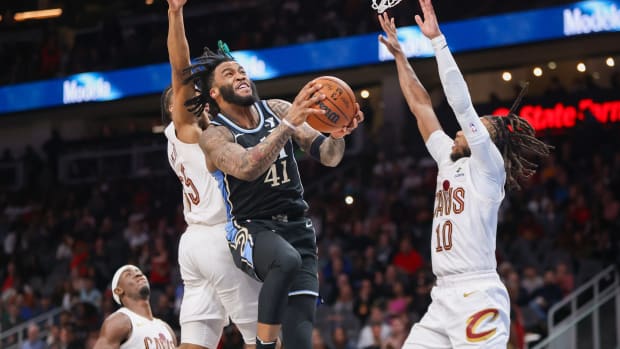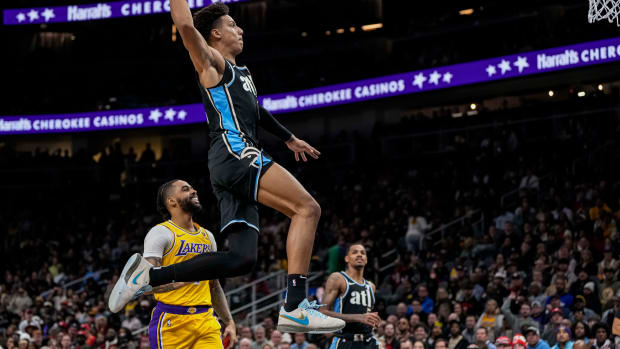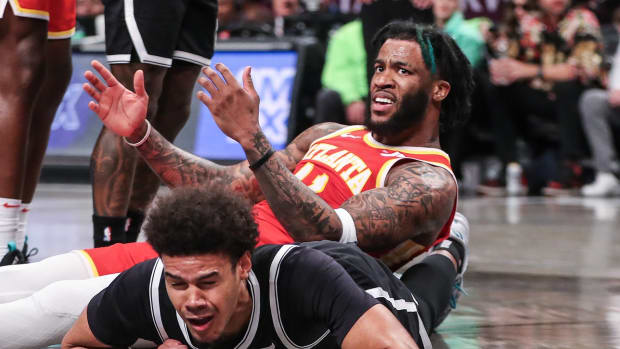Three Shooters the Hawks Could Target In Free Agency
In order to achieve their goal of making the playoffs next season, the Hawks will likely need more than just internal growth from their young players. Trae Young and John Collins are already good enough to be key offensive contributors on a postseason squad, and getting Clint Capela back from a heel injury will help solidify Atlanta’s rotation, but the roster is thin on playoff-caliber rotation players beyond those three. Even with improvement from Kevin Huerter, De’Andre Hunter, and Cam Reddish, the Hawks will need to add contributors via free agency this summer to put themselves squarely in the mix for a playoff berth.
Chief among Atlanta’s offseason priorities should be improving its 3-point shooting. Even with their highest-volume gunners shooting above-average percentages, the Hawks ranked last in the NBA in 3-point percentage last season. Atlanta created efficient looks with Young on the floor, and will almost certainly do so again next season; it needs to fill out the roster with players capable of capitalizing on those opportunities.
“We need to add guys that give us the capability to continue to stretch the floor,” Lloyd Pierce said. “All of those [young] guys want to and will look to improve on their shooting, but we need to add shooting as well.”
Three players headline a free agent class relatively thin on shooting, any of which could help the Hawks open up the floor and a path to the postseason:
Joe Harris (Brooklyn Nets)
Harris will be the best shooter on the market this summer, which should make him a particularly appealing option for the Hawks. The 28-year-old is more than a mere floor-spacer; he is a weapon capable of bending defenses out of shape. Harris shot nearly 43 percent on over five 3-point attempts per game in four seasons with the Nets, and took a difficult diet of attempts. While he would give the Hawks a spot-up threat they didn’t have last season, Harris is also one of the league’s preeminent shooters coming off screens, and can bury difficult shots even under heavy contests.
That kind of shooter has gravity that would significantly open up Atlanta’s offense and keep defenses from loading up on Young when he has the ball. Brooklyn’s offense was meaningfully better in each of the last three seasons with Harris on the court -- a product of both his scoring and his gravity. He doesn’t need the ball to be effective, which would make him a clean fit in the Hawks Young-centric offense. He creates most of his shots by moving without the ball, and just the threat of him flying off a screen for an open shot does more damage to opponents than most players can with the ball in their hands:
Harris doesn’t offer much in the way of playmaking and doesn’t create much for himself off the bounce, though he can attack closeouts and get to the rim when defenders fly by on pump fakes. He competes defensively and has the size to check both wing positions, but shouldn’t be counted on as a stopper on primary scorers.
With Kevin Durant and Kyrie Irving returning next season, Harris won’t be as essential to the Nets’ offense as he has been in recent years. Every team could use a shooter of his caliber, but Brooklyn might not feel the same pressure to keep him around now that it has two world-class offensive talents to carry more of the load. Harris will likely command somewhere between $10 and $15 million annually, and Atlanta, with nearly $50 million in cap space and a dire need for shooting, can afford to outbid most other suitors for that kind of specialist. Other teams around the league can offer Harris a chance to win more games or more playing time, but the Hawks could have the most persuasive combination of money and opportunity for a player in the middle of his prime and yet to maximize his earning power.
Dāvis Bertāns (Washington Wizards)
Bertāns has long been one of the smoothest shooting big men in the NBA, but last season was unleashed in Washington to a degree he never had been in San Antonio. Bertans nearly doubled his volume of 3-point attempts per game while essentially maintaining his lethal accuracy, and the Wizards’ offense soared as a result. Washington scored better than 1.15 points per possession with Bertāns on the floor last season, and the Latvian forward never hesitated to let fly from beyond the arc. Bertāns ranked fourth in the NBA last year in field goals from at least 28 feet, giving him more gravity than even his impressive raw shooting numbers would suggest. At 6-foot-10, he has a high, compact release, but can shoot on the move in a way most players his size can’t. He’s fluid enough to fly around screens and go straight into a shot, and skilled enough to pull up in transition with defenders flying at him:
Much like Harris, he can be a dynamic part of his team’s offense without the ball in his hands. He can put the ball on the floor and attack closeouts, and his size makes him a threat to finish at the fim (even if his efficiency there took a dip last season). Bertāns takes very little off the table offensively, and would fill Atlanta’s hole at backup power forward and its general need for shooting. For the Hawks to sign him would be to double down on their goal of having a top-10 offense next season.
Bertāns isn’t a great individual defender, but his length allows him to contest shots and make up some ground against smaller players. He generally puts himself in the right places as a help defender, but doesn’t provide much in the way of rim protection or disruption in the passing lanes. Still, he’d likely be an upgrade over some of Pierce’s options off the bench last season, and would give Atlanta a reliable offensive contributor.
It could be difficult, however, for the Hawks to sway Bertāns into coming to Atlanta. He is good enough to start on many teams around the NBA or give a championship contender a boost off the bench. As a Hawk, he’d likely do neither. Atlanta could throw him a contract with a high annual salary or long-term security, but it might not be worth going that far for Bertāns -- helpful though he’d be.
Evan Fournier (Orlando Magic)
With a $17 million player option for the 2021 season, Fournier could stand to lock in a long-term deal at a higher salary after the best season of his career (though potential salary-cap ramifications of COVID-19 could change his thinking on that option). At age 27, the Frenchman averaged a career-high 18.8 points on nearly 60 percent true shooting last year while shouldering the heaviest offensive load of his career. Fournier isn’t quite a pure shooter or a true secondary playmaker, but his combination of nearly every perimeter offensive skill makes him a threat in many capacities.
He drilled over 40 percent of his 3-pointers last season, shot a career-high 66 percent at the rim, and posted the second-highest assist rate of his career, all in an offense that afforded him very little breathing room. He isn’t the acrobat Harris or Bertāns is firing off of screens, but Fournier is more dangerous off the dribble and attacking closeouts. He can also initiate his team’s offense in the pick-and-roll and create opportunities reasonably well in isolation when the shot clock winds down. He’d need to do less of that in Atlanta than he did in Orlando, which lacked offensive firepower, and therefore might find his scoring opportunities easier to come by.
If Atlanta signs Fournier, it will have to be willing to dislodge at least one of Huerter, Reddish, or Hunter from the starting lineup (it may have to do that anyway). It isn’t clear that Fournier would be so essential as to command $20 million annually and cut into the young Hawks’ minutes, which could reduce his appeal to this particular team. Still, he would immediately become one of Atlanta’s best players in many key areas. In a relatively weak free-agent class, it’s hard to find many players as well-rounded offensively as Fournier.




